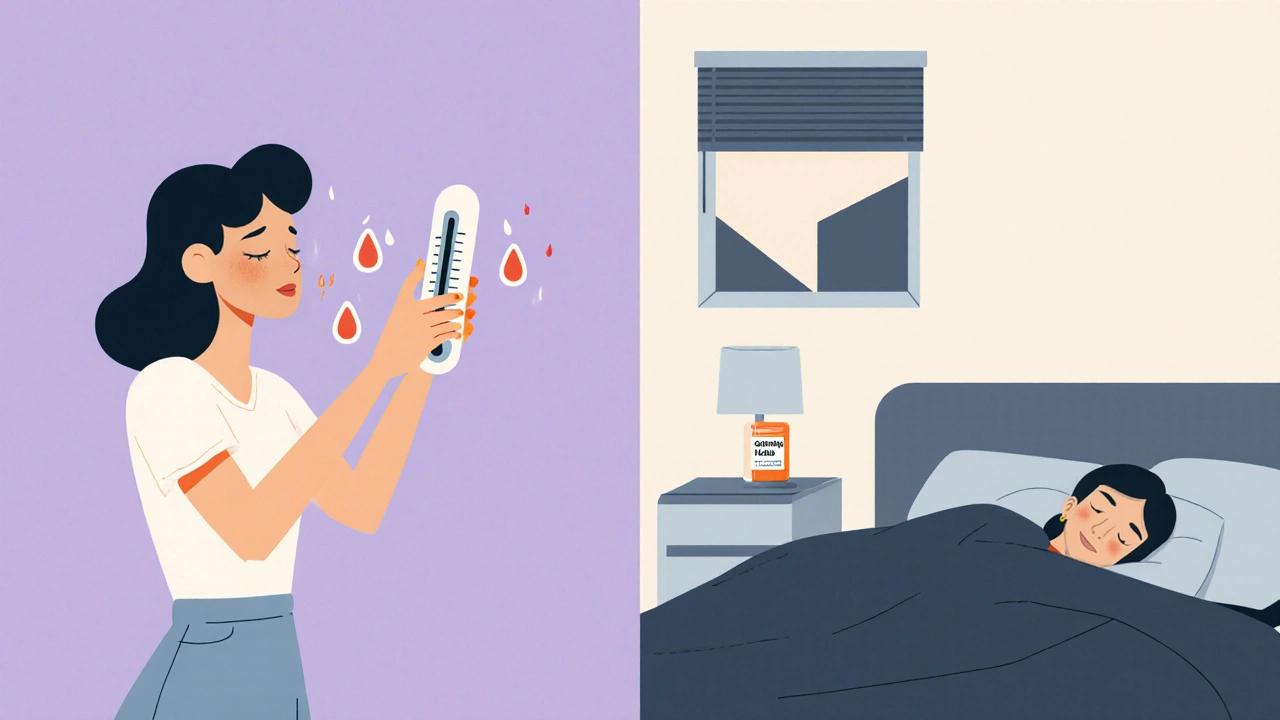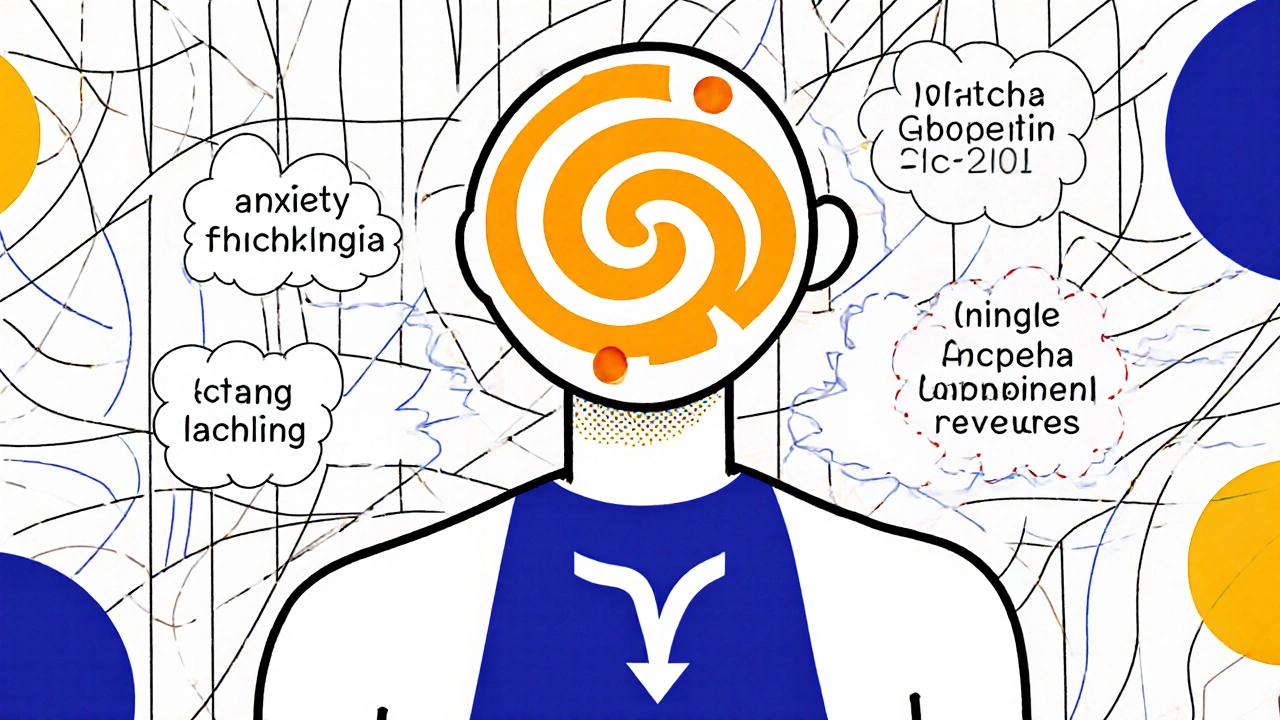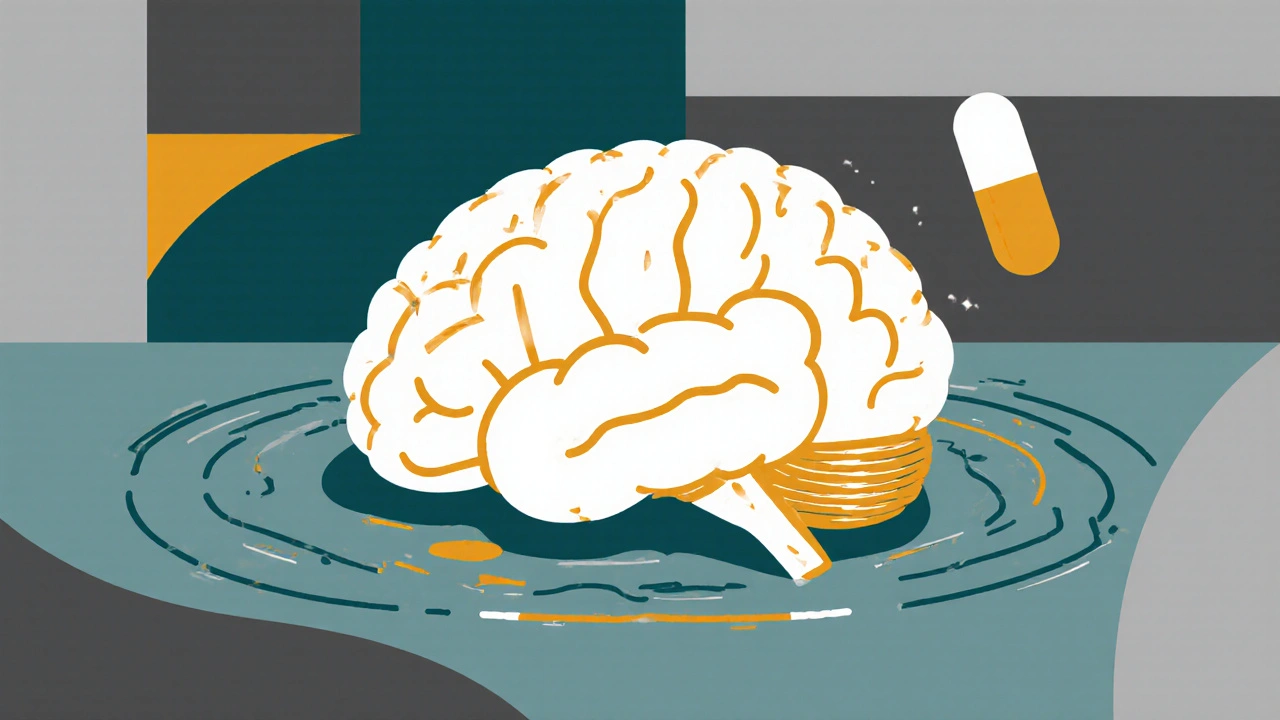Most people know gabapentin as a seizure medication or a treatment for nerve pain. But if you’ve heard about someone taking it for insomnia, anxiety, or even hot flashes, you’re not alone. These aren’t random guesses - they’re backed by real studies. Gabapentin is one of the most commonly prescribed off-label drugs in the UK and the US, and while it’s FDA-approved for epilepsy and postherpetic neuralgia, doctors use it for dozens of other conditions every day. The question isn’t whether it works for these uses - it’s which off-label uses actually have solid evidence behind them.
Why Do Doctors Prescribe Gabapentin Off-Label?
Off-label prescribing isn’t illegal or shady. It’s legal, common, and often necessary. The FDA approves drugs based on specific trials, but the body doesn’t care about those labels. If a drug affects nerve signaling, it might help with anything tied to overactive nerves - from restless legs to migraines. Gabapentin works by calming overactive neurons, mostly by binding to calcium channels in the brain. That mechanism is why it helps with seizures and nerve pain. But it also means it can quiet down other types of nervous system chaos.
In the UK, the NHS doesn’t restrict off-label use. Doctors follow guidelines from NICE and clinical experience. A 2023 review in the British Journal of Clinical Pharmacology found that over 40% of gabapentin prescriptions in primary care were for off-label reasons. That’s not a small fraction - it’s the norm.
Anxiety Disorders: More Than Just a Calming Effect
Many patients report feeling calmer on gabapentin. But does that mean it’s a reliable anxiety treatment? Research says yes - for some.
A 2020 meta-analysis of 12 randomized controlled trials, published in Journal of Clinical Psychiatry, found gabapentin significantly reduced symptoms of generalized anxiety disorder (GAD) compared to placebo. The effect size was similar to low-dose benzodiazepines, but without the risk of dependence. It worked best in patients with moderate to severe anxiety who hadn’t responded to SSRIs.
It’s not a first-line treatment. But for people who can’t tolerate SSRIs or who have anxiety tied to chronic pain or withdrawal, gabapentin can be a game-changer. One patient in Bristol, a 58-year-old nurse with long-term GAD and neuropathic pain, switched from sertraline to gabapentin after experiencing sexual side effects. Within six weeks, her sleep improved, her panic attacks dropped by 70%, and she was able to return to part-time work.
Chronic Pain Beyond Nerve Damage
Gabapentin is approved for postherpetic neuralgia - pain after shingles. But what about fibromyalgia? Back pain? Migraines?
For fibromyalgia, the evidence is strong. A 2021 Cochrane review of 11 trials concluded gabapentin reduced pain by at least 30% in nearly half of patients. It also improved sleep and fatigue - two big issues in fibromyalgia. The UK’s NICE guidelines now list gabapentin as an option for fibromyalgia when other treatments fail.
For lower back pain? Not so much. A 2023 trial in The Lancet found gabapentin no better than placebo for non-specific chronic low back pain. It didn’t help mobility or reduce opioid use. So if your back pain isn’t nerve-related, gabapentin won’t fix it.
For migraines, the data is mixed. Some small studies show it reduces frequency, but it’s not as effective as topiramate or beta-blockers. Still, for patients who can’t take those, it’s an option.
Restless Legs Syndrome and Insomnia
Restless legs syndrome (RLS) is a neurological disorder where legs feel uncomfortable, especially at night. Gabapentin enacarbil - a prodrug of gabapentin - is FDA-approved for RLS. But regular gabapentin? It works too.
A 2022 study in Neurology found that 600-1,200 mg of gabapentin nightly improved RLS symptoms in 75% of patients. It also improved sleep quality, which matters because RLS often keeps people awake. For insomnia not tied to RLS? The evidence is weaker. Some patients report falling asleep faster, but that’s likely due to drowsiness, not true sleep regulation. It’s not a replacement for cognitive behavioral therapy for insomnia (CBT-I), but it can help in the short term.

Alcohol and Opioid Withdrawal
When someone stops drinking or using opioids, their nervous system goes into overdrive. Tremors, anxiety, sweating, even seizures - it’s dangerous. Gabapentin helps calm that storm.
A 2023 trial in JAMA Psychiatry showed gabapentin reduced alcohol withdrawal symptoms as effectively as benzodiazepines, with fewer risks of sedation and respiratory depression. It also reduced cravings. In the UK, some addiction clinics now use it as part of outpatient detox programs.
For opioid withdrawal, the data is less robust but still promising. A 2021 pilot study at a Bristol clinic found gabapentin helped ease anxiety, muscle aches, and insomnia during detox. Patients reported feeling more stable and less likely to relapse.
Hot Flashes and Menopause Symptoms
Hot flashes are a nightmare for many women during menopause. Hormone therapy works, but not everyone can take it - especially those with a history of breast cancer.
Two randomized trials, one in Menopause (2022) and another in JAMA Internal Medicine (2023), found gabapentin reduced hot flash frequency by 40-50%. It wasn’t as strong as low-dose estrogen, but it was better than placebo and had fewer side effects than paroxetine (an antidepressant sometimes used for this). The typical dose: 300 mg at bedtime. Many women notice improvement within a week.
What Doesn’t Work - And Why
Not every off-label use holds up. Gabapentin won’t help with depression, bipolar disorder, or chronic fatigue syndrome. A 2022 review in Psychological Medicine found no significant benefit for major depressive disorder. It also doesn’t reduce arthritis pain or improve muscle strength in MS.
And here’s the catch: gabapentin’s effectiveness often depends on the underlying cause. If pain is inflammatory, not neuropathic, it won’t touch it. If anxiety is trauma-based, it might help with symptoms but won’t fix the root. That’s why doctors need to match the drug to the mechanism - not just the diagnosis.

Side Effects and Risks
Gabapentin is generally safe, but it’s not harmless. The most common side effects are dizziness, drowsiness, and swelling in the hands or feet. These usually fade after a few weeks. But in older adults, the risk of falls increases. That’s why doses are often kept low - 300-900 mg per day - especially for those over 65.
There’s also a growing concern about misuse. In the UK, gabapentin was reclassified as a Class C controlled drug in 2019 because of its potential for abuse, especially when mixed with opioids or alcohol. It’s not addictive like benzodiazepines, but people do take it to get high or to ease withdrawal from other substances. That’s why prescriptions are now monitored more closely.
How to Know If It’s Right for You
If you’re considering gabapentin for an off-label use, ask your doctor these questions:
- Is my condition likely caused by overactive nerves?
- Have I tried first-line treatments, and did they fail or cause bad side effects?
- What dose and duration are you recommending?
- How will we monitor for side effects?
- What’s the plan if it doesn’t work after 4-6 weeks?
Don’t start or stop gabapentin suddenly. It can cause withdrawal seizures. Tapering down over weeks is essential.
The Bottom Line
Gabapentin isn’t a miracle drug. But for specific conditions - anxiety, fibromyalgia, RLS, alcohol withdrawal, and hot flashes - it’s a well-researched, often effective tool. The key is matching the right condition with the right patient. It’s not about what’s on the label - it’s about what the science says works. And for many people, that’s exactly what makes gabapentin valuable.
Is gabapentin addictive?
Gabapentin isn’t addictive in the same way as opioids or benzodiazepines, but it can be misused. Some people take it to get high or to ease withdrawal from other drugs. Because of this, it’s now a controlled substance in the UK. The risk is higher when combined with alcohol or opioids. Always take it exactly as prescribed.
How long does it take for gabapentin to work for anxiety?
For anxiety, most people notice a difference within 1-2 weeks, but it can take up to 4 weeks for full effect. Unlike SSRIs, which build up slowly, gabapentin works faster because it directly affects nerve signaling. Still, don’t expect instant relief - patience is key.
Can gabapentin help with migraines?
Some studies show gabapentin can reduce migraine frequency by about 30%, but it’s not as effective as topiramate or propranolol. It’s usually considered only if other preventatives don’t work or cause side effects. It doesn’t help with acute migraine attacks - only prevention.
Does gabapentin cause weight gain?
Yes, weight gain is a known side effect, especially at higher doses (over 1,800 mg/day). It’s likely due to increased appetite and drowsiness reducing activity. On average, people gain 2-5 kg over 6 months. If weight gain becomes a problem, talk to your doctor about lowering the dose or switching.
Can I drink alcohol while taking gabapentin?
No. Alcohol increases drowsiness, dizziness, and the risk of falls. It can also worsen depression and raise the chance of misuse. Even a single drink can make side effects worse. If you’re taking gabapentin, avoid alcohol completely.
If you’re using gabapentin for an off-label reason, keep a symptom journal. Note your sleep, pain levels, mood, and side effects. Bring it to your next appointment. That kind of data helps your doctor decide if it’s working - or if it’s time to try something else.
